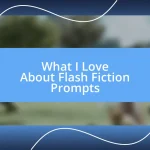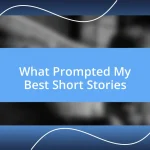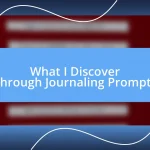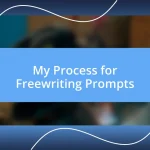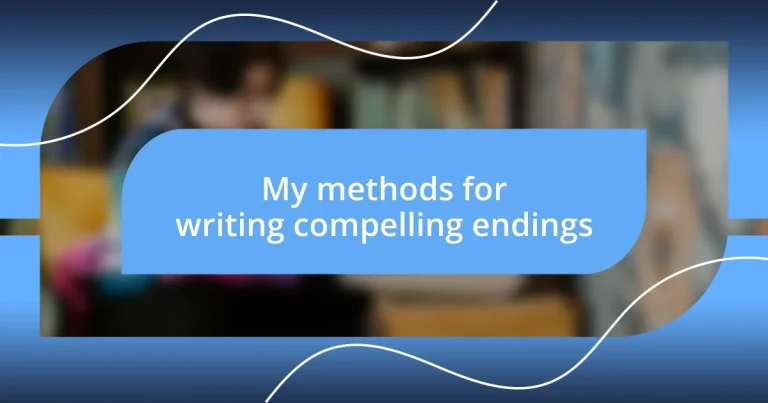Key takeaways:
- Endings are crucial in storytelling, as they can leave a lasting impact and reinforce central themes, transforming a narrative from forgettable to unforgettable.
- Effective endings often rely on emotional resonance, surprise elements, and thematic resolution, creating a satisfying closure that reflects back on earlier points in the story.
- Revising for clarity and impact is essential; using precise language, reading aloud, and ensuring a connection to the reader’s personal experiences can elevate the overall resonance of the ending.
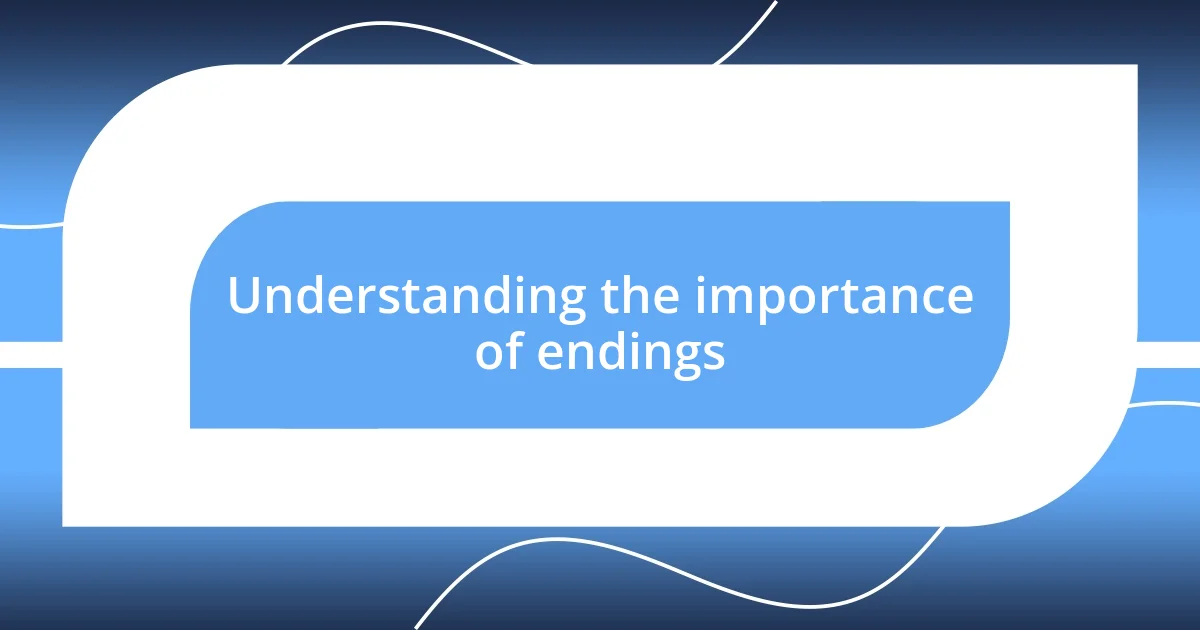
Understanding the importance of endings
Endings hold a unique power in storytelling—they can leave a lasting impact or fade quietly into memory. I remember reading a novel that concluded with an unexpected twist, making me reflect long after I had turned the last page. Have you ever had a moment where an ending reshaped the entire story for you? That’s the magic we should aim for; a well-crafted ending can transform our writing from forgettable to unforgettable.
When I think about my favorite movies or books, it’s often the last moments that resonate most deeply. I once watched a film that concluded with a single lingering shot, a haunting silence, and it struck me to my core. How does it make you feel when a story wraps everything up in a neat little bow, versus leaving you with questions that linger? The way an ending is executed can evoke strong emotions, leading to powerful connections that encourage readers to engage with the work long after they’ve finished.
Also, endings have the potential to reinforce themes and messages embedded throughout the narrative. For instance, when I conclude a piece by revisiting the central idea, it feels like tying up loose ends while inviting reflection. Isn’t it fascinating how much weight a few final lines can carry? They should serve as a poignant reminder, urging both the writer and the reader to ponder the journey they’ve taken together.
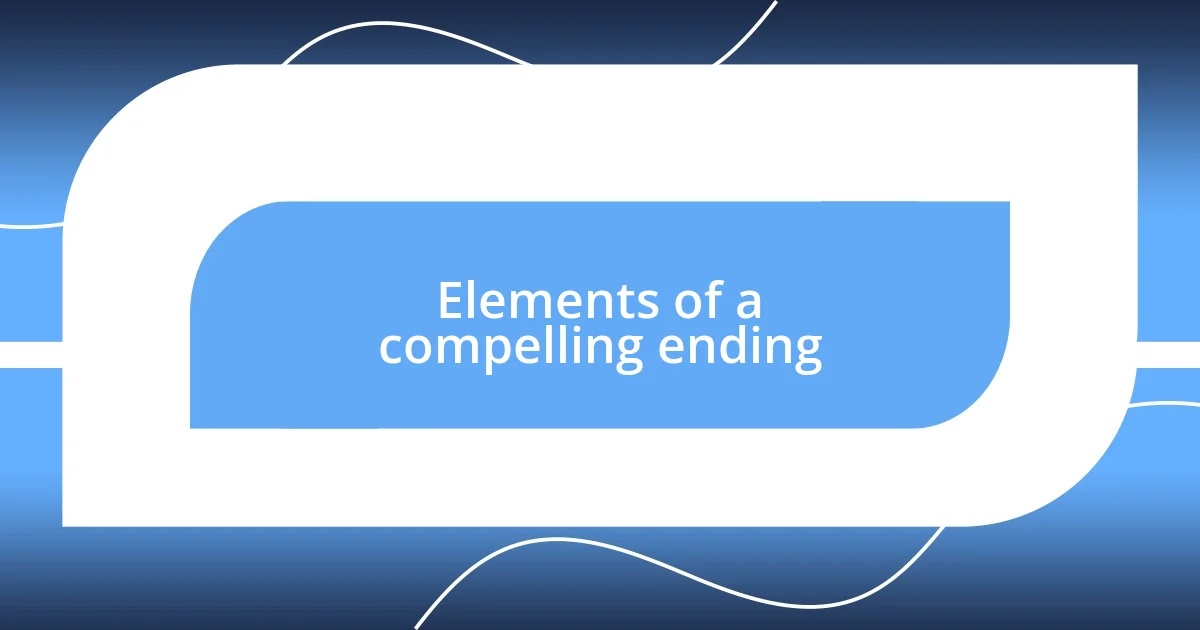
Elements of a compelling ending
A compelling ending often relies on emotional resonance. I vividly recall finishing a short story where the last line brought tears to my eyes, encapsulating the entire struggle of the character in a single, heart-wrenching phrase. It felt like a shared moment between the writer and me, one that lingered in my thoughts. Doesn’t it feel incredible when a beautifully crafted ending leaves you with a bittersweet aftertaste?
Additionally, the element of surprise in an ending can elevate a story tremendously. I’ll never forget a mystery novel that ended with a revelation I hadn’t seen coming. The moment I realized the truth, I was dumbfounded. It’s exciting when a twist adds depth to the plot rather than feeling like a mere gimmick. Have you ever experienced this rush of emotion when everything you thought you knew is flipped upside down?
Lastly, some of the most effective endings circle back to the story’s core themes. I’ve penned a few stories where I revisited an earlier metaphor, and it painted the conclusion with a sense of continuity. I find that when endings reflect back on earlier points, it creates a satisfying closure that honors both the work put into the story and the reader’s investment. Does it not provide a richer experience when everything comes together like puzzle pieces?
| Element | Description |
|---|---|
| Emotional Resonance | Evokes strong feelings, enabling a lasting impact on the reader. |
| Surprise | Introduces an unexpected twist that redefines the reader’s perspective on the story. |
| Thematic Resolution | Ties back to the central themes, creating a sense of continuity and fulfillment. |
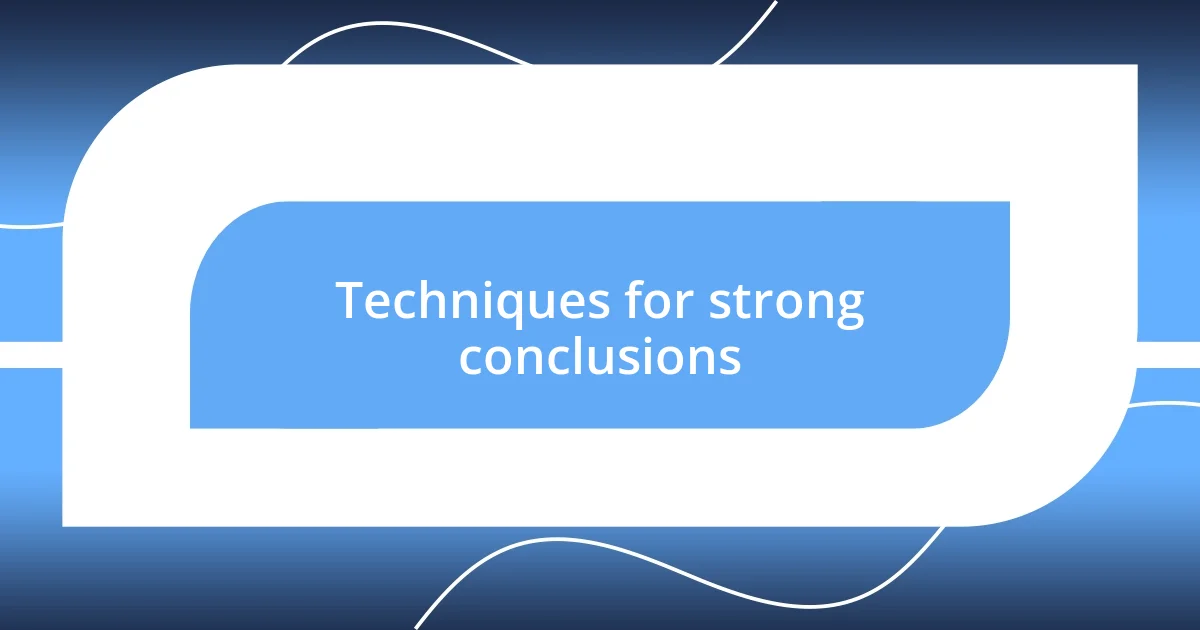
Techniques for strong conclusions
When crafting a strong conclusion, I often find that a call to action can be incredibly effective. It prompts readers to not just reflect, but also to act on the insights they’ve gained. For example, after sharing a poignant narrative about personal growth, I once encouraged readers to jot down their own reflections. It sparked a conversation that lingered well beyond the page. Doesn’t it feel rewarding when your writing pushes others to engage in meaningful ways?
Here are a few techniques I’ve employed for impactful conclusions:
- Summary of Key Points: Briefly reiterate the main ideas to reinforce their importance. This not only helps the reader remember but also gives closure.
- Reflective Questions: Pose thought-provoking questions that challenge the reader to think deeper. I’ve noticed that it often leads to personal exploration.
- Imagery or Symbolism: End with a powerful image that evokes emotion, much like a chef presenting a final dish. I believe it leaves a vivid imprint on the mind.
- Personal Anecdote or Real-World Connection: Sharing a related personal experience can add a layer of authenticity. I remember concluding a piece about resilience with a heartfelt story that connected our collective experiences, highlighting our shared struggles.
In my experience, blending these techniques creates a multi-faceted conclusion that resonates with readers, making them feel like part of the story long after they’ve closed the book.
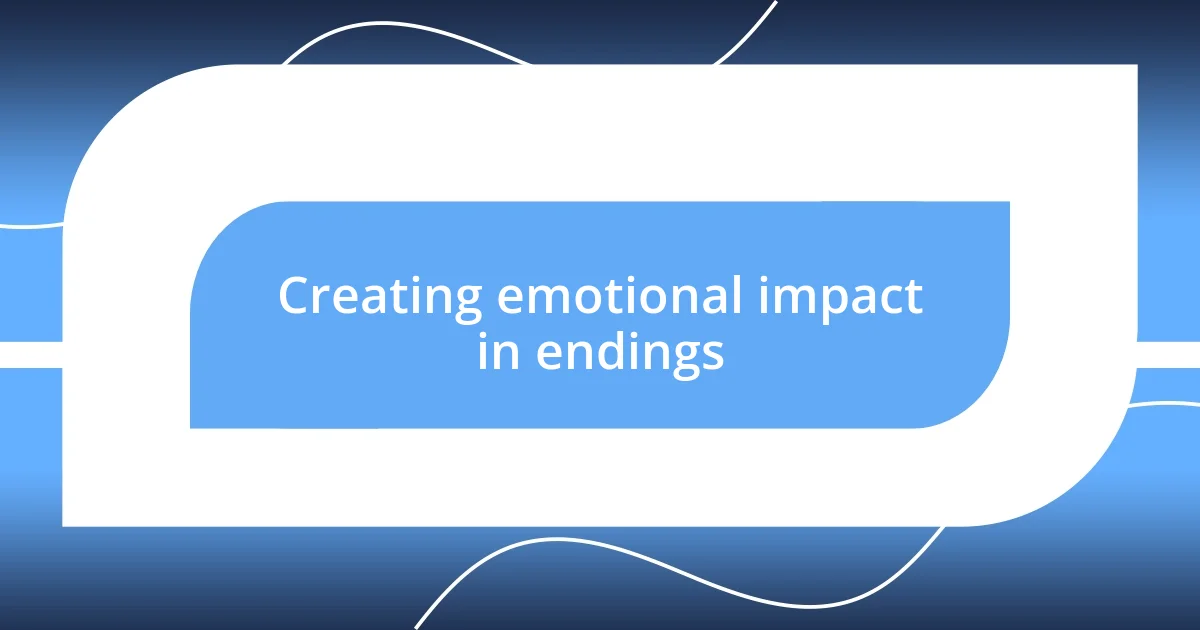
Creating emotional impact in endings
Creating an emotional impact in endings is a powerful tool for any writer. There have been moments in my writing where I’ve poured all my feelings into the last few lines, hoping to evoke a similar sense of yearning in my readers. I recall a time when I ended a narrative by describing a character’s lonely walk home under a fading sunset. That imagery lingered with me long after, and I hoped it did the same for my readers. Can you remember an ending that struck you emotionally, leaving you reflecting on its meaning?
A significant part of crafting that emotional punch lies in authenticity. When I write a scene that draws from my own experiences, I can almost feel the weight of the emotions on the page. For instance, during a challenging period in my life, I wrote about a character overcoming adversity and finding hope. That personal connection made it easier to breathe life into the story’s conclusion. Don’t you find that when a writer’s vulnerability shines through, it resonates more deeply with you?
Lastly, timing and pacing in the ending contribute greatly to its emotional impact. I’ve experimented with longer pauses before the final line, creating a palpable tension that draws the reader in. In one story, I chose to stretch a pivotal moment—like a character’s final realization of love—over several sentences. The result was electric. Have you ever noticed how a well-timed pause in a narrative can make the resolution feel more profound? It’s truly captivating when every element comes together to create a crescendo of emotion.

Linking endings to themes
Linking your ending to the central themes of your piece is crucial for providing a cohesive reading experience. I often think about how unsatisfying it can feel when a story ends in a way that feels disconnected from what it set out to explore. For instance, during a writing workshop, I shared an ending where the protagonist embraced their identity, effectively tying back to the theme of self-acceptance I had woven throughout the narrative. That moment was more than just a culmination; it was a celebration of everything that had led up to it, reinforcing the core message.
I’ve found that the most powerful endings echo the underlying themes, leaving the reader with a resonance that lingers. In one of my stories about friendship, I ended with the characters reflecting on their shared memories, which reinforced the theme of connection in challenging times. It’s fascinating how, by circling back to these themes, I’m able to evoke emotions and give readers a sense of closure. Have you ever closed a book and felt like the ending left a piece of the story hanging? That’s why connecting endings to established themes is vital—it helps ground the narrative and ensures a fulfilling conclusion.
Moreover, exploring the implications of the theme in the ending can add layers to the conclusion. I remember crafting a story where the final lines hinted at new beginnings, even as the characters faced an ending. This duality not only tied back to the theme of resilience but also left the door open for readers to ponder what comes next. Isn’t it thrilling when a conclusion not only resolves a story but also sparks curiosity? It feels like an invitation for readers to engage with the themes beyond the page, fostering a deeper connection to the work.
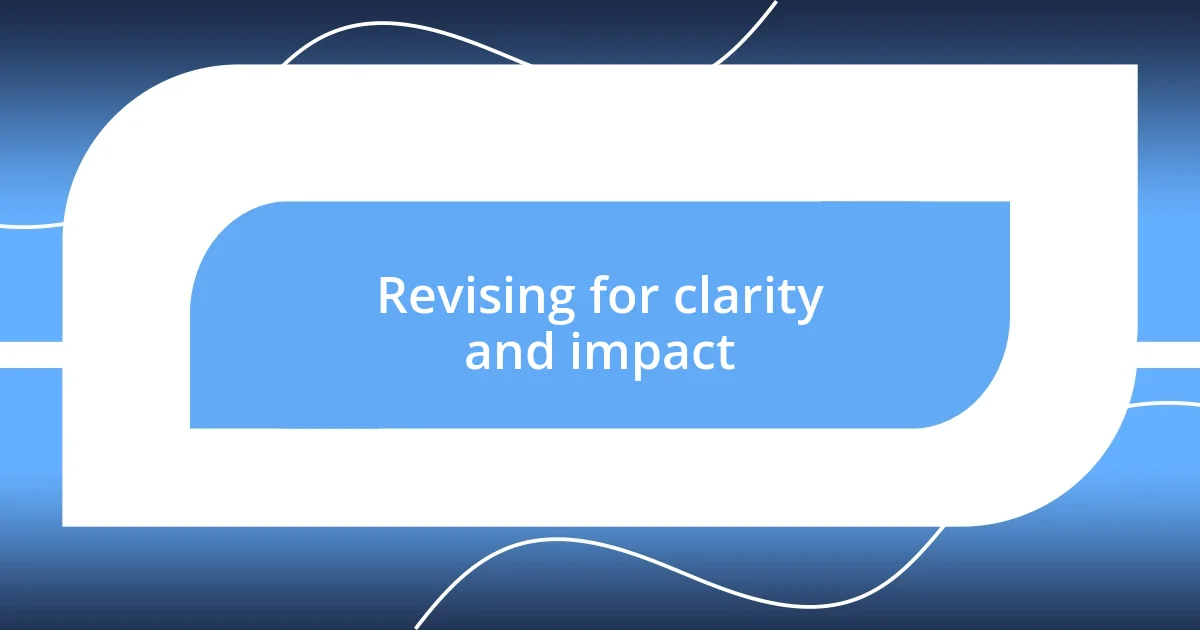
Revising for clarity and impact
Revising for clarity and impact is an essential step in crafting a memorable ending. I often find myself going through several drafts, honing in on language that cuts through the noise. In one instance, after receiving feedback, I realized a pivotal moment in my story needed to be more direct. I replaced complex phrases with clear imagery, making the character’s emotions hit home. Have you ever felt stuck in convoluted wording that obscured your message? Simplifying the language can sometimes be the key to unlocking a more powerful finale.
When revising, I pay close attention to every word’s weight. It’s surprising how a single word can alter the entire tone of a sentence. For example, in one of my recent pieces, I replaced “suddenly” with “unexpectedly,” shifting the impact of a climactic moment. This not only streamlined the narrative but also enhanced the emotional gravitas, leaving the reader with a more profound sense of surprise. When you look closely at your choices, do you notice moments where a shift in word choice could elevate your writing?
Lastly, I make sure to read my ending aloud during the revision process. Hearing the flow can reveal awkward phrasing or pacing issues that I might not catch while reading silently. I once discovered that a sentence dragged on longer than it needed to when I voiced it. By trimming it down, I allowed the closing lines to resonate more powerfully with the reader. Have you tried this approach? It can transform an ending from ordinary to unforgettable, ensuring that the emotional impact lingers long after the final word.
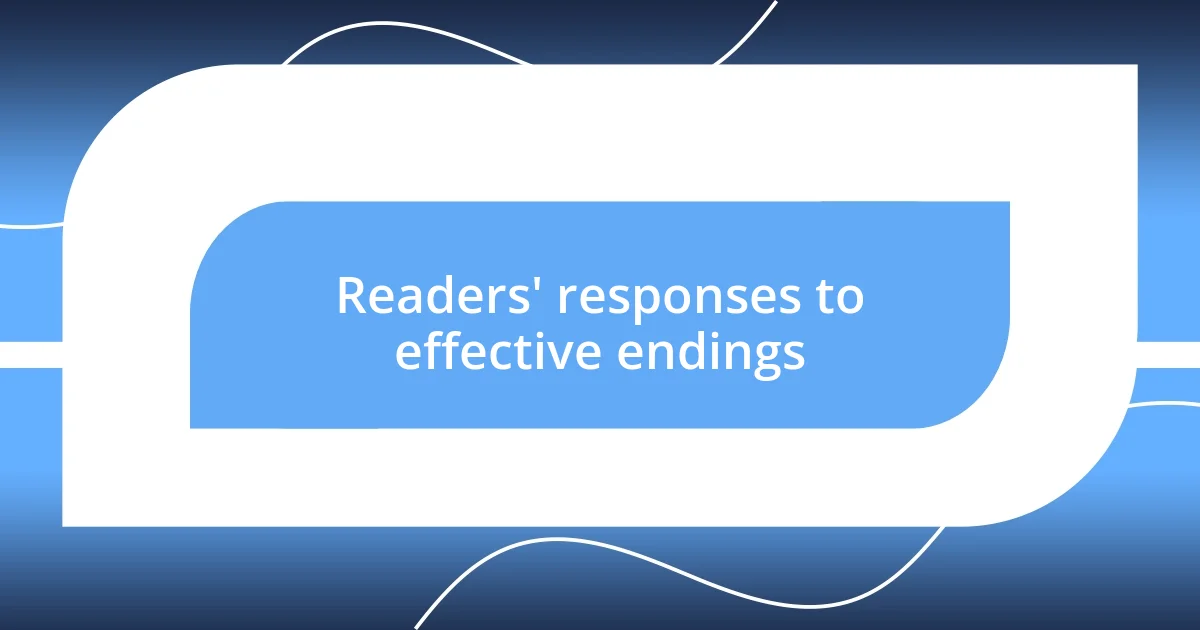
Readers’ responses to effective endings
When I reflect on readers’ responses to effective endings, I often recall a heartfelt conversation with a friend after she finished my short story. She described how the ending left her both satisfied and contemplative, making her ponder her own life choices. It reminded me of how an ending can resonate deeply, creating a bridge between the story’s conclusion and the reader’s personal experiences. Why is it that certain endings stay with us long after the pages have been turned? I believe it’s because they mirror our own hopes, fears, and desires, sparking a connection that is both poignant and lasting.
I’ve observed that readers frequently express a cathartic release when an ending captures the essence of the journey. For instance, I once shared a piece in a writing group where the protagonist found closure after a tumultuous relationship. The audience’s emotional responses were palpable; some even laughed, while others teared up. It was a powerful reminder of how effective endings can weave empathy into the fabric of a story, turning mere words into shared human experiences. Have you ever felt that rush of emotion as a narrative comes to a close? It’s that shared connection that acknowledges our struggles and triumphs, and it can leave a reader feeling understood.
Moreover, the diversity of reader interpretations can be fascinating. I remember a book club discussion about a novel with an ambiguous ending. While some members were frustrated, others embraced the uncertainty as an invitation to explore their own conclusions. This sparked a rich dialogue about the nature of endings and their potential to evoke varied responses. Isn’t it interesting how a single closing line can ignite such different feelings? It’s a testament to the power of good storytelling—where an ending does more than conclude; it fosters exploration, leaving readers questioning and reflecting long after they’ve set the book aside.


